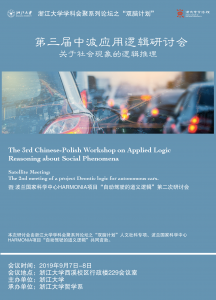3rd Chinese-Polish Workshop on Applied Logic — Reasoning about Social Phenomena
September 7-8th, 2019
Zhejiang University, Hangzhou, China

Home Deontic Logic for Autonomous Cars Programme Special Issue Travel Information Newsletter
Social phenomena means a form of collective behaviour, such as accepting or rejecting innovations in technology. The aim of this workshop is to find a formal language to describe the dynamic impact (e.g. market, social norms, and their temporal reproduction) on people’s collective behaviour. One example we want to address in particular is a formal account of expected social behavior and reception of autonomous cars. Applying a logic to reason about social phenomena should result in patterns of making predictions and explanations of what happened and what may happen under some borderline conditions.
This workshop is one of the series of international workshops on applied logic organized in China or in Poland. The first workshop of the series took place in Beijing at Beijing Normal University in December 9-10th, 2017 (http://kognitywistyka.kul.pl/chinese-polish-workshop-applied-logic/); the second – in Toruń at Nicolaus Copernicus University in Toruń in September 28th, 2018 (http://ncl.umk.pl/LNK18/ProgramPCHw.pdf).
This workshop is funded jointly by the Convergence Research Project for Brain Research and Artificial Intelligence of Zhejiang University (titled “Logic, Cognition and Artificial Intelligence Research Team”) led by Beishui Liao at Zhejiang University and by the Poland National project HARMONIA (titled “Deontic logic for autonomous vehicles”) led by Piotr Kulicki at John Paul II Catholic University of Lublin, Poland.
A special issue of Bulletin of the Section of Logic (http://www.filozof.uni.lodz.pl/bulletin/) connected to the subject of the workshop: Reasoning about Social Phenomena is planned. The editors are Tomasz Jarmużek, Fengkui Ju, Piotr Kulicki and Beishui Liao.
Participants (confirmed):
Diego Agustin Ambrossio (University of Luxembourg, Luxembourg)
Mehdi Dastani (University of Utrecht, the Netherlands)
Jiahong Guo (Beijing Normal University, China)
Ryutaro Ichise (Japanese National Institute of Informatics, Japan)
Tomasz Kwarciński (Cracow University of Economics, Poland)
Ruipeng Lei (HUST, Wuhan, China)
Kai Li (Chinese University of Political Science and Law, China)
Fenrong Liu (Tinghua University, China)
Réka Markovich (University of Luxembourg, Luxembourg)
Marek Sergot (Imperial College, London, UK)
Xin Sun (John Paul II Catholic University of Lublin, Poland & Sun Yat-Sen University, China)
Leon van der Torre (University of Luxembourg, Luxembourg)
Workshop (program and organization) committee:
Huimin Dong (Zhejiang University, China)
Tomasz Jarmużek (Nicolaus Copernicus University in Toruń, Poland)
Fengkui Ju (Beijing Normal University, China)
Beishui Liao (Zhejiang University, China)
Piotr Kulicki (John Paul II Catholic University of Lublin, Poland)
Yì N. Wáng (Zhejiang University, China)
